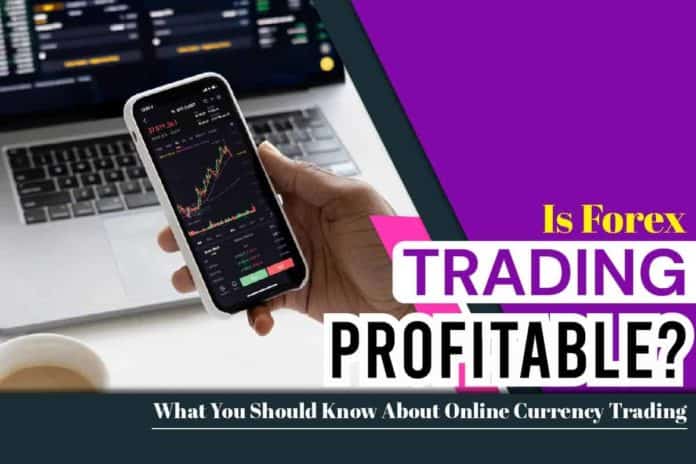Forex trading is the conversion and exchange of the value of one currency against the other in a currency pair. Gaining or losing in Forex trading is determined by whether the current market trend favors selling or buying. This means you can either buy or sell a currency pair in Forex Trading, and you gain if the market trend tends your option (buy or sell).
Forex trading is one of the most traded markets in the world. The trader is expected to open a Forex funded account to trade. As a beginner, you may want to open a virtual account before investing real money into forex trading. A Virtual account allows you to practice and perfect your trading strategies before you eventually start trading the actual currencies. Forex has an average daily traded volume of 5 trillion dollars, making it the largest and most liquid asset market globally.
Is Forex Trading Profitable?
The answer to this question is Yes and No! Forex trading is profitable if you are a deep-pocket or skilled forex trader ready to invest massively in the currency trading business. Forex trading is hardly profitable for the average retail trader who invests just a few hundred bucks. In his case, forex trading may become a quick way to poverty and huge losses.
Forex trading is profitable, for instance, to someone who invests a minimum of $10,000 and decides to use a very low trade margin to minimize loss. An individual trader who invests $500 and has little skill in forex trading can quickly lose his or her money.
For this reason, Forex trading often favors heavy investors over beginner investors who want to get rich quickly.
Types Of Forex Trading Work?
Unlike the shares and commodities market, forex trading doesn’t happen on exchanges; instead, it occurs between two parties. It is run by a global group of banks spread across different major trading centers and in different time zones. The major forex trading centers are located in New York, London, Tokyo, and Sydney.
Since there is no central location for trading forex, you can trade 24 hours from Monday to Friday every week.
There are three main types of Forex markets, these are;
- Spot forex market
- Forward forex market, and
- Future forex market.
The spot forex market refers to the physical exchange of a pair of currency. This trading takes place where the exchange of currency happens and within a short period.
The forward index market is a market where an agreement to buy or sell a certain amount of currency pair is made on a forex platform at specified prices and settled at the nearest future date.
The future forex market is a forex trading type where a currency pair is sold or bought at an agreed price and a specific future date. Unlike the forward forex market type, the futures forex trading contracts are legally binding.
Types Of Currency Pairs In Forex Trading
To keep things in order on forex trading platforms, currency pairs are grouped into four, and these are; Major pairs, minor pairs, Exotics, and regional pairs. Major pairs comprise seven currencies that make up80% of the global forex trading. Major pairs include EUR/USD, USD/JPY, GBP/USD, USD/CHF, USD/CAD, AUD/USD.
The minor pairs are less traded currency pairs and included major currencies pairing except the US dollar. Minor pairs include EUR/GBP, EUR/CHF, GBP/JPY.
The exotics pairs pitched major currency against relatively unpopular ones. The exotic pairs include USD/PLN (Polish zloty) and USD/MXN (Mexican Peso).
Regional pairs are those classified as regional currencies. For instance, North American currencies Australasia or Scandinavia pairs (for example, USD/NOK (Norwegian Krona).
How Does Forex Trading Works?
There are several ways you can trade Forex, even though they all work the same way. The most primary ways of trading forex are to buy or sell a currency pair. Traditionally, forex trading can also be conducted via a forex broker. With online trading platforms, you can view currency price movements that will help you determine the real trend to decide whether to buy or sell currency pairs.
There is a CFD training method where leveraged products are used. The CFD trading will allow you to open a position for a fraction of the full value of trade. Unlike the non-leveraged products, you cannot take ownership of an asset but simply take a position on whether the market will rise or fall.
Spread, Lot, Leverage And Margin In Forex Trading
To trade Forex, you must be aware of some terms: spread, lot, leverage, and margin. The spread is the difference between sell and buy prices that are quoted for a forex pair. Currency re traded in lots, hence lots can be described as batches of currencies used in standard trading. While forex trading moves in small amounts, lots on the other hand move in large quantities with many currency pairs traded once.
Leverage in forex trading simply means gaining exposure to many pairs of currencies without paying full value for the trades upfront. With leverage, you get a full profit of a currency pair value for paying for a fractional margin.
Margin is part of leveraging in Forex. It is the initial deposit you put down to open and maintain a leveraging in Forex. Pips in Forex is the unit of measurement in a forex pair movement.
Conclusion
There are several benefits attached to forex trading in addition to the monetary returns. His ability to go short or long in trading forex is another benefit. You go long when you sell the same currency pair for a very long time. Many people go long when they are accurate in predicting the trends of a particular currency pair. Since forex trading is available 24 hours except on Saturdays and Sundays, you can design to enter the trading market at your convenience and exit at your convenience too. Forex trading is no doubt profitable if you are able to invest more than the average beginner due to higher spread , leverage and margin.












